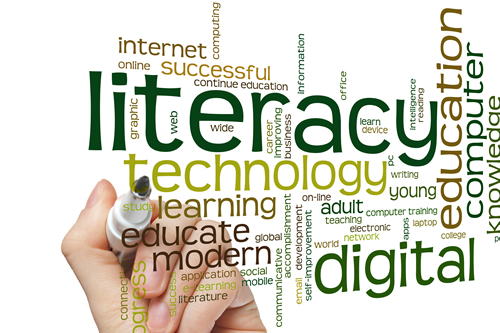
How do we navigate around computers or a tablet? How do we use a cellphone? How does anyone understand these technologies? The importance of digital literacy is growing every year. Every time someone creates a new website or a new shortcut the knowledge changes. With the amount of change that happens with technology, teachers and students need to be able to understand the basics to grow a foundation. Then be able to add onto their knowledge to help keep up with the world that is technology. It’s a technology world we are just living in it.
As a teacher, it can be hard to keep up with changes that get thrown at us from every direction. Having digital literacy can make most things easier. We can communicate with parents and even each other quickly. We can use videos, lesson ideas, and tools, and we can find everything we ever wanted to know right at our fingertips,
“ A teacher well-versed in digital literacy and internet safety can engage with these inquiries, fostering deeper understanding and critical thinking with students. However, when a teacher lacks expertise, they might struggle to answer questions accurately, leaving students to question their teacher’s real understanding of today’s online world.” (The White Hatter)
Having skills that we can build upon for ourselves and our students helps in so many ways. Nowadays we can find new ways to teach. Although teaching with technology can have it benefits but it does comes with its draw backs as well. Most of the time it comes from slow connection to wifi or if someone forgot to charge the device and if all of a sudden the device just stops working. Plus, even though we can adapt our lessons easier which in return makes our student’s lives much easier, it can be a challenge to adapt the technology to those who need it. Unless you have the resources.
“The benefits of digital literacy include improving young learners’ writing, reading, listening, and speaking skills, getting used to authentic materials, increasing the frequency of digital technology use, enhancing online collaboration between teacher-learners and learners” (Buckingham)
The more we can communicate with others the more we learn and grow. As a teacher, we never stop learning about the world around us. We help create the next generation and shape them for the ever-changing world.
- Teach students how to evaluate the information they find online
- Discuss online privacy with students
- Help students understand online etiquette
- Teach digital writing
- Discuss AI tools and academic integrity

For students or any learner, it’s important to have digital literacy. They can learn better and they can create so many things. They can write papers with accurate information, they can create art and share it with the world, start a business from their homes, learn world cultures from the world in a classroom and they can find out about their ancestors with a click of a button. The world is at their fingertips and the world is their oyster. Communication is the first thing that comes to mind with digital literacy. The more we know and can learn the more we can strive.
There are so many skills that come out of using computers. They are not just a distraction for games or social media,
“In relation to the internet, for example, children need to learn how to locate and select material – how to use browsers, hyperlinks search engines, and so on. But to stop there is to confine digital literacy to a form of instrumental or functional literacy. The skills that children need in relation to digital media are not confined to those of information retrieval. As with print, they also need to be able to evaluate and use information critically if they are to transform it into knowledge. This means asking questions about the sources of that information, the interests of its producers, and the ways in which it represents the world; and understanding how these technological developments are related to broader social, political and economic forces.” (Buckingham)
The stronger students can be with digital literacy the stronger they will be in life. It opens up jobs. It helps them succeed in their studies. So much information is shared every day being able to decipher what is real and what is fake is huge. Digital literacy can help form opinions and can help discover real answers to questions.
It’s important for everyone to have digital literacy. Being able to communicate with each other and discover what we can about the world. It will change everything we do.
Buckingham, David. “Defining digital literacy-What do young people need to know about digital media?.” Nordic journal of digital literacy 10.Jubileumsnummer (2015): 21-35.
The White Hatter “The Challenges of ‘Boxed’ School-Based Digital Literacy and Internet Safety Lesson Plans!” the White Hatter, 1 Sept. 2023, https://thewhitehatter.ca/blog/the-challenges-of-boxed-school-based-digital-literacy-internet-safety-lesson-plans/
Vos, Lesley J. “Teaching Digital Literacy to Students in 2023.” eLearning Industry, June 2023, elearningindustry.com/teaching-digital-literacy-to-students-in-2023.


Leave a Reply